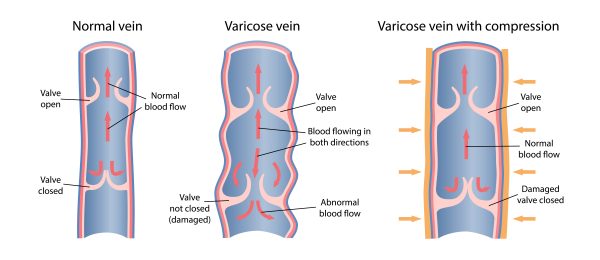Have you ever had a cut on your finger, put a band-aid on and then a few later, it’s no better? The frustration of wasted effort and time while still having a cut can be quite annoying, and that’s just with a small cut. When it comes to a more serious procedure, where you spend time, money and travel, the last thing you want is for the problem to come back. While a small cut may be simple to deal with, veins are somewhat more complicated. When considering if you should seek assistance, you want to be sure: “Is varicose vein treatment successful?”
For more than a century, doctors and clinicians have been treating varicose veins, and over those years, the technology, research and methods have all improved drastically to give you the best chance at recovery. When you’re undergoing any kind of medical procedure, there are always variable elements that can affect how well it will go, including the general health and follow-up efforts of the patient, the doctor themselves and the procedure itself.
Is varicose vein treatment successful?
Treating varicose veins successfully can mean one thing to the doctor, and another to the patient. While one person will be wanting to treat the painful symptoms of varicose veins, another will want them to be completely removed.
To help you navigate this medley of expectations, we spoke to a few vein doctors to outline what defines a successful varicose vein treatment. It’s important to note that varicose veins can’t be cured, only treated. There is always a chance that a new varicose vein will appear in that location. The following are the most common measures of success:
- Successful closure/sealing of the varicose vein.
- Reduced pain and swelling.
- No recurrence of the varicose vein.
- Visible disappearance of the vein.
When treated, there still may be some bulging veins or discolouration across the legs, but these fade over time. Traditional treatments like sclerotherapy and surgical stripping are normally initially successful, but are more likely to leave physical issues like scarring or staining, and have a higher chance of recurring varicose veins down the track.
With modern treatments like EVLA (Endovenous Laser Ablation) 95-98 per cent of treatments are considered successful with no recurrence. The EVLa procedure is normally done in a 30-60 minute session, usually with shorter follow up sessions of sclerotherapy to remove the smaller bulging veins. With the speed, effectiveness and clinical benefit of EVLA, this type of treatment are the most successful around.
How do I make sure treatment is successful?
While the procedure itself is finished within an hour, there is still plenty you can do to maximise the results and protect yourself from other veins developing into varicose veins.
As well as following the aftercare instructions from your clinician, there are a few core things which can help support the overall health of your veins:
- Wear compression stockings while at work or travelling for long periods.
- Exercise regularly, even if it’s just a 20-minute walk each day.
- Cut down on fat and sugar, and eat more fruits and vegetables.
- Maintain a healthy weight (ideally within 10kgs of your healthy BMI weight)
Read more: Three signs it’s time to get your varicose veins treated.
Seek expert advice
The doctors at The Vein Institute specialise in varicose vein treatment. We offer patients a comprehensive program using non-surgical laser treatment techniques.
The benefits of non-surgical varicose vein treatment are:
- Walk-in walk-out treatment
- 98% success rate
- Extremely effective
- Can be performed at a clinic (no hospitalisation)
- No general anaesthetic
- Medicare rebates apply
- No downtime or time away from work
Call us at 13 VEINS (that’s 13 83467), or fill out our booking request form.
Before and after: Before and After Varicose Vein Treatment


